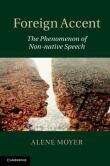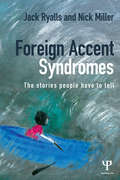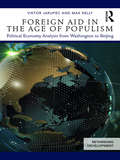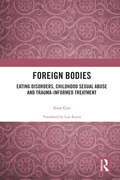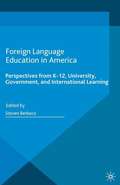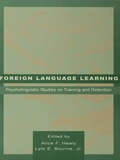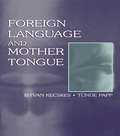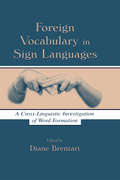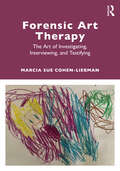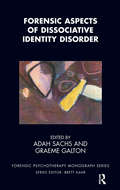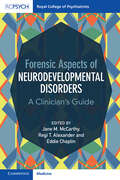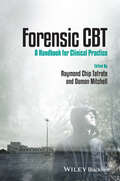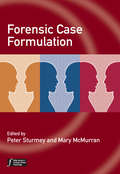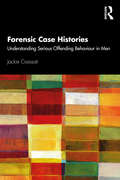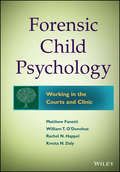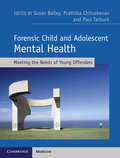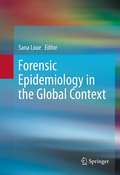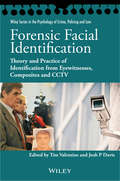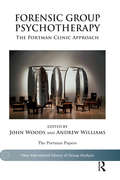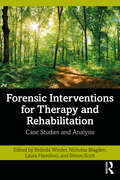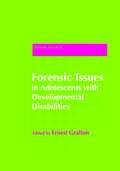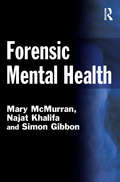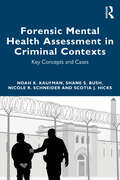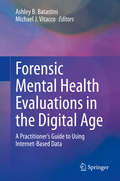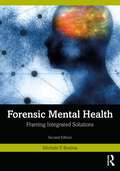- Table View
- List View
Foreign Accent
by Alene MoyerTo what extent do our accents determine the way we are perceived by others? Is foreign accent inevitably associated with social stigma? Accent is a matter of great public interest given the impact of migration on national and global affairs, but until now, applied linguistics research has treated accent largely as a theoretical puzzle. In this fascinating account, Alene Moyer examines the social, psychological, educational and legal ramifications of sounding 'foreign'. She explores how accent operates contextually through analysis of issues such as: the neuro-cognitive constraints on phonological acquisition, individual factors that contribute to the 'intractability' of accent, foreign accent as a criterion for workplace discrimination, and the efficacy of instruction for improving pronunciation. This holistic treatment of second language accent is an essential resource for graduate students and researchers interested in applied linguistics, bilingualism and foreign language education.
Foreign Accent Syndromes: The stories people have to tell
by Nick Miller Jack RyallsWhat does it feel like to wake up one day speaking with a foreign accent from a country one has never visited? Why does someone wake up doing this? This book seeks to portray the broad and diverse experiences of individuals with a rare neurological speech disorder called Foreign Accent Syndrome (FAS). Through a combination of personal testimony and scientific commentary, the book aims to shed unprecedented light on the understanding of FAS by elucidating the complex links between how the brain produces speech, how listeners perceive speech and the role that accent plays in our perception of self and others. The first part of the book provides a comprehensive introduction to FAS and covers a number of key subject areas, including: • The definition and phenomenology of FAS • A history of research on FAS • The causes and psychosocial consequences of FAS • A guide to further reading and a glossary of specialized terms. The chapters in part two provide a unique insight into the condition through personal testimony and accounts from family members. This collection of 28 testimonies from across the world underlines the importance of listening carefully to patients explain their cases, and in their own words. The final section contains a questionnaire for use by clinicians to support case history taking. The authors are two leading global experts on FAS, and this is the first volume of its kind to provide such a broad and comprehensive examination of this rare and poorly understood condition. It will be of great interest to practising clinicians in neurology, psychiatry, psychology and speech and language therapy/pathology, as well as students in health disciplines relevant to neurorehabilitation, linguists and also to families and caregivers.
Foreign Aid in the Age of Populism: Political Economy Analysis from Washington to Beijing (Rethinking Development)
by Viktor Jakupec Max KellyAcross the world the Western dominated international aid system is being challenged. The rise of right-wing populism, de-globalisation, the advance of illiberal democracy and the emergence of non-Western donors onto the international stage are cutting right to the heart of the entrenched neoliberal aid paradigm. Foreign Aid in the Age of Populism explores the impact of these challenges on development aid, arguing that there is a need to bring politics back into development aid; not just the politics of economics, but power relations internally in aid organisations, in recipient nations, and between donor and recipient. In particular, the book examines how aid agencies are using Political Economy Analysis (PEA) to inform their decision making and to push aid projects through, whilst failing to engage meaningfully with wider politics. The book provides an in-depth critical analysis of the Washington Consensus model of political economy analysis, contrasting it with the emerging Beijing Consensus, and suggesting that PEA has to be recast in order to accommodate new and emerging paradigms. A range of alternative theoretical frameworks are suggested, demonstrating how PEA could be used to provide a deeper and richer understanding of development aid interventions, and their impact and effectiveness. This book is perfect for students and researchers of development, global politics and international relations, as well as also being useful for practitioners and policy makers within government, development aid organisations, and global institutions.
Foreign Bodies: Eating Disorders, Childhood Sexual Abuse, and Trauma-Informed Treatment
by Anat GurForeign Bodies: Eating Disorders, Childhood Sexual Abuse, and Trauma-Informed Treatment addresses the association between eating disorders and childhood sexual abuse, proposing a new way of treating those suffering from eating disorders who were sexually abused as children. Based on testimonies of survivors of abuse who subsequently developed eating disorders, it offers a new form of diagnosis and treatment, arguing that the eating-disorder field often ignores the traumatic sources of eating disorders, leading to some treatment programs not being commensurate, and at times conflicting, with the principles of childhood sexual abuse treatment. The case studies used to highlight the link between childhood sexual abuse and eating disorders are presented from the perspective of the women involved, in their own words. Their voices are supplemented by Gur’s own stance as a clinician specializing in the treatment of sexual abuse and CPTSD. The book is divided into three parts: the first deals with eating disorders, childhood sexual abuse, and the association between them; the second examines the treatment of eating disorders and childhood sexual abuse; and the third offers a new form of diagnosis and treatment for eating disorders. This book will be of great interest to researchers and postgraduate students in the eating disorder field of psychotherapy, psychology, or psychiatry, plus those studying the treatment of trauma. It will also be of interest to clinical dieticians, psychologists, social workers, doctors, nurses, eating disorder specialists, and policymakers in the mental health field, as well as eating disorders sufferers and those who care for them.
Foreign Language Education in America: Perspectives from K-12, University, Government, and International Learning
by Steven BerbecoForeign language teaching in America today falls into three distinct fields of influence and interest: public and private schools, college and other post-secondary programs, and courses for adult learners. At a time when academics and instructors in each of these fields seek to answer similar questions, too few published resources recognize and address the parallels among them.
Foreign Language Learning: Psycholinguistic Studies on Training and Retention
by Alice F. Healy Lyle E. BourneBased on a research project funded by the Army Research Institute, Foreign Language Learning reports original empirical and theoretical research on foreign language acquisition and makes recommendations about applications to foreign language instruction. The ultimate goal of this project was to identify a set of psychological principles that can provide the foundation for--or at least, argumentation for--a foreign language training course. This book reviews the various studies of which the project is comprised. It begins with an overview chapter outlining the scope of the project and summarizing some of the experiments that were conducted in the laboratory. In each of the following chapters, the contributors report on previously unpublished research on selected specific psycholinguistic training principles; vocabulary and concept acquisition; language comprehension; reading processes; and bilingualism. The final chapter--prepared by a prominent expert on second language training--provides an overview and evaluation of the contribution of the research described in earlier chapters to the goal of improving instructional methods in foreign language learning. Sandwiched between the introductory and final chapters are four major sections: * Vocabulary and Concept Acquisition, which discusses the effect of first-language phonological configuration on lexical acquisition in a second language, contextual inference effects in foreign language vocabulary acquisition and retention, mediated processes in foreign language vocabulary acquisition and retention, and the status of the count-mass distinction in a mental grammar; * Language Comprehension, which addresses voice communication between air traffic controllers and pilots who are nonnative speakers of English, cognitive strategies in discourse processing, and the effects of context and word order in Maasai sentence production and comprehension; * Reading Processes, which discusses the enhancement of text comprehension through highlighting, the effect of alphabet and fluency on unitization processes in reading, and reading proficiency of bilinguals in their first and second languages; and * Bilingualism, which addresses Stroop interference effects in bilinguals between similar and dissimilar languages, the individual differences in second language proficiency, and the hierarchical model of bilingual representation.
Foreign Language and Mother Tongue
by Istvan Kecskes Tnde PappThis is the first book that discusses the effect of foreign language learning on first language processing. The authors argue that multilingual development is a dynamic and cumulative process characterized by transfer of different nature, and results in a common underlying conceptual base with two or more language channels that constantly interact with each other. Language representation and processing are discussed from a cognitive-pragmatic rather than a lexical-syntactic perspective. This required the review of several crucial issues of L2 acquisition, such as transfer, vocabulary development, conceptual fluency, and pragmatic skills. The authors also reviewed a large body of literature touching on cognitive psychology, linguistics, psycholinguistics, SLA, philosophy, and education in order to explain multilingual development and the positive effect of foreign language learning on the first language. An important read for linguists and language educators alike, this volume: * attempts to explain multilingual development from a cognitive-pragmatic perspective, * argues that foreign language learning has a positive effect on the development and use of mother tongue skills, * relies on research findings of several different disciplines, * builds on the results of quantitative research conducted by the authors, and touches on a wide range of literature.
Foreign Vocabulary in Sign Languages: A Cross-Linguistic Investigation of Word Formation
by Diane BrentariThis book takes a close look at the ways that five sign languages borrow elements from the surrounding, dominant spoken language community where each is situated. It offers careful analyses of semantic, morphosyntactic, and phonological adaption of forms taken from a source language (in this case a spoken language) to a recipient signed language. In addition, the contributions contained in the volume examine the social attitudes and cultural values that play a role in this linguistic process. Since the cultural identity of Deaf communities is manifested most strongly in their sign languages, this topic is of interest for cultural and linguistic reasons. Linguists interested in phonology, morphology, word formation, bilingualism, and linguistic anthropology will find this an interesting set of cases of language contact. Interpreters and sign language teachers will also find a wealth of interesting facts about the sign languages of these diverse Deaf communities.
Forensic Art Therapy: The Art of Investigating, Interviewing, and Testifying
by Marcia Sue Cohen-LiebmanForensic Art Therapy is designed as an educational and informative resource for individuals from a diverse array of disciplines that engage in investigatory undertakings, interview victims and witnesses, and provide evidentiary testimony. The material presented serves as a primer for professionals that may present in court on behalf of a client. Ethical issues inherent in the forensic arena, as well as the use of novel scientific evidence in the form of drawings, legal proceedings, testimonials, and practical tips and strategies for effective witnessing, are shared. Research regarding a forensic art therapy investigative interview process, the Common Interview Guideline, examines the facilitative factor associated with the effect of drawing. When utilized as a primary resource within investigative interviews, drawing has the potential to offer support, promote empowerment and enhance disclosure. Understanding how drawing functions in investigative interviews and what it offers for the child, the team and the process contributes to on-going research and best practice. The text serves as a resource and a handbook for students and professionals that investigate, interview, testify and intervene on behalf of child victims and witnesses from the domains of child protection, law enforcement, prosecution, the judiciary, creative arts therapies, social work and allied practitioners in medicine and mental health.
Forensic Aspects of Dissociative Identity Disorder (The Forensic Psychotherapy Monograph Series)
by Brett Kahr Estela Welldon Adah Sachs Graeme GaltonThis ground-breaking book examines the role of crime in the lives of people with Dissociative Identity Disorder, formerly known as Multiple Personality Disorder, a condition which appears to be caused by prolonged trauma in infancy and childhood. This trauma may be linked with crimes committed against them, crimes they have witnessed, and crimes they have committed under duress. This collection of essays by a range of distinguished international contributors explores the complex legal, ethical, moral, and clinical questions which face psychotherapists and other professionals working with people suffering from Dissociative Identity Disorder. Contributors to this book are drawn from a wide range of professions including psychotherapy, psychoanalysis, counselling, psychology, medicine, law, police, and social work.
Forensic Aspects of Neurodevelopmental Disorders: A Clinician's Guide
by Eddie Chaplin Jane M. McCarthy Regi T. AlexanderEvidence has shown a high prevalence of neurodevelopmental disorders amongst offenders in custodial institutions. Bringing together the latest knowledge and understanding, this book describes the needs of offenders who present with neurodevelopmental disorders, including autism spectrum disorder, ADHD, intellectual disability and foetal alcohol spectrum disorders. The book covers aetiology, prevalence, comorbid mental disorders, legal issues, assessment including risk assessments, diagnosis and therapeutic approaches. It describes care pathways through the criminal justice system across the UK and internationally, including the current and ongoing developments of services for this group. With contributions from experts in the field including psychiatrists, researchers and psychologists, this book provides a comprehensive summary of the evidence whilst ensuring the focus is for the everyday clinician working in this area. It is an invaluable resource for psychiatrists and other professionals working across the criminal justice system and within forensic services.
Forensic CBT
by Damon Mitchell Raymond Chip TafrateForensic CBT: A Handbook for Clinical Practice is an edited collection that represents the first authoritative resource on the utilization of CBT strategies and techniques for offender clients.Features contributions from leaders of the major schools of CBT on the treatment of antisocial personality patterns as well as anger, interpersonal violence, substance abuse, and sexual aggressionAddresses modified CBT approaches for female, juvenile, and culturally diverse forensic populationsCovers emerging areas of forensic practices, including the integration of motivational interviewing and strength-based approachesIncludes an assortment of worksheets, handouts, and exercises for practitioners to use with their clients
Forensic Case Formulation
by Peter Sturmey Mary McmurranForensic Case Formulation is the first text that describes the principles and application of case formulation specifically to forensic clinical practice. Addresses risk assessment and its implications for case formulation and treatmentCovers a range of serious forensic problems such as violence, sexual offending, personality disorder, and substance misuseOffers guidance in training clinicians on ways to create useful formulations
Forensic Case Histories: Understanding Serious Offending Behaviour in Men
by Jackie CraissatiForensic Case Histories: Understanding Serious Offending Behaviour in Men examines men’s violent and sexual offending behaviours, outlined through a series of real offender narratives, from a psychological perspective and in an accessible manner that will engage any audience, from the criminology-intrigued layperson to the specialist in the field. This unique and conversational text thinks psychologically about serious crime, offering a compilation of men’s narratives that explore their life experiences and the ways in which these experiences influence their behaviour in adulthood. Each chapter addresses a particular theme, covering frequently asked questions in the field such as, 'How can an apparently motiveless offence have meaning?' and 'Is psychopathy a personality disorder, and why do we struggle to treat individuals with such traits?' The narratives of individuals who offend are central to the discussion, but the chapters each draw on the relevant facts from the research literature and highlight key learning points. Many chapters also feature 'Further Reading' sections to expand readers’ knowledge. Both educational and accessible, Forensic Case Histories will appeal not only to specialists but to any layperson curious to understand more about criminal acts. It is especially valuable to students and instructors of criminal justice, mental health, and related fields.
Forensic Child Psychology
by William T. O'Donohue Matthew Fanetti Kresta N. Daly Rachel Fondren-HappelA guide to working effectively with children in the criminaljustice system Uniquely designed to train psychology, criminology, and socialwork students to work with children in the criminal justicesystem--both in the courtroom and as clinicalclients--Forensic Child Psychology presents currentresearch and practice-based knowledge to improve the judicial andchild welfare systems.Authors Matthew Fanetti, William T. O'Donohue, Rachel N. Happel,and Kresta N. Daly bring their combined expertise in childpsychology, forensic interviewing, and criminal prosecution to bearon the process of obtaining accurate information from childreninvolved in legal proceedings, preparing professionals to workwith:Children who are victims of crimeChildren who are perpetrators of crimeChildren who are witnesses of crimeThe book also covers related topics, including mandatedreporting, the structure of juvenile justice and advocacy systems,and contains sidebars, summaries, glossaries, and study questionsto assist with material mastery.This is an excellent resource for students of childpsychopathology in psychology, social work, nursing, and criminaljustice at the graduate and late undergraduate stage of theireducations.
Forensic Child and Adolescent Mental Health: Meeting the Needs of Young Offenders
by Susan Bailey Prathiba Chitsabesan Paul TarbuckWritten for practitioners and policymakers, this book will help professionals across health, education, social care and juvenile justice services to understand the needs of young offenders and adolescents at risk of entering the criminal justice system. Developmental in approach, the textbook provides a comprehensive overview of forensic child and adolescent mental health, using cases to help clinicians link theoretical principles to practice and understand how mental health and neurodevelopmental impairment can relate to offending behaviour. With an emphasis on preventive initiatives, early intervention and the building of psycho-social resilience through the delivery of values based practice, this book highlights the need for comprehensive assessment for young people across multiple domains of their lives. This book is of interest to all clinicians working within mental health teams, practitioners working with children and adolescents, professionals involved with youth justice and medico-legal issues, and politicians responsible for establishing health and social policy.
Forensic Epidemiology in the Global Context
by Sana LoueAs globalization causes profound changes in business, industry, and trade,it can also have significant effects on populations, environments, and individuals.These effects may be harmful, resulting in injury or illness, prompting the critical question: How best to correct wrongs caused to individuals, communities, and/or the environment of one country by the actions of individuals or corporations of another? Possible answers lie in an emerging discipline. Forensic Epidemiology in the Global Context opens meaningful windows onto the processes of forensic epidemiology, the roles of the epidemiologist in civil disputes, and the potential contribution of the field to legal and justice efforts worldwide. Case examples from the U.K., Nigeria, Ecuador, Romania, and Australia illustrate commonly used methodologies and the challenges involved in their use in U.S. and international courts of law. A chapter on expert testimony takes readers through qualification and admissibility issues, report requirements, and working with attorneys. Included in the coverage: Forensic epidemiology in the international legal arena.The epidemiologist as an expert in litigation.Epidemiological evidence in tort law: dispatches from the U.K.Liability for occupational exposure: the role of epidemiology.Forensic epidemiology and environmental justice.Forensic epidemiology, pathology, ethnics, and human rights.By emphasizing both the scientific and legal components of the equation, Forensic Epidemiology in the Global Context gives researchers and graduate students in epidemiology a unique and timely guide to the present and future of an increasingly salient field.
Forensic Facial Identification: Theory and Practice of Identification from Eyewitnesses, Composites and CCTV (Wiley Series in Psychology of Crime, Policing and Law)
by Tim Valentine Josh P DavisForensic Facial Identification discusses the latest scientific and technical advancements in the field and their implications for practice in psychology, criminology, and law. Provides an up-to-date set of best practices for forensic facial identification Reviews current procedures for different facial identification methods and their reliability Covers eyewitness testimony, line-ups, facial composites, anthropological face reconstructions, CCTV images, and computerized automatic face recognition systems Incorporates case studies which put the latest research and technology in the proper legal context
Forensic Group Psychotherapy: The Portman Clinic Approach (The New International Library of Group Analysis)
by John WoodsThis book is about the practice and underlying theory of psychodynamic group therapy as undertaken in the Portman Clinic. It offers an overview of various matters requiring sophisticated thinking in the structuring of forensic group psychotherapy.
Forensic Interventions for Therapy and Rehabilitation: Case Studies and Analysis
by Nicholas Blagden Belinda Winder Laura Hamilton Simon ScottForensic Interventions for Therapy and Rehabilitation: Case Studies and Analysis provides an up-to-date overview of the latest therapeutic ideas being used for forensic service users and prisoners in both custodial and community settings. The field of forensic work is increasingly being recognised for its importance, both in terms of the value of the work in reducing reoffending and in terms of the salience given to it by the media, the public, and politically. This text reflects current policy and practice, and furthermore considers the therapeutic encounter from a broad perspective, which incorporates individual, group, and systemic interventions. Forensic Interventions for Therapy and Rehabilitation includes chapters on a range of therapeutic models, issues pertinent to specific groups of people with criminal convictions, and discussion on the various contexts in which interventions take place. Forensic Interventions for Therapy and Rehabilitation is essential reading for all students of Forensic or Clinical Psychology, as well as practitioners in the field.
Forensic Issues in Adolescents with Developmental Disabilities
by Ernest GraltonAdolescents with developmental disabilities are a complex population who require specialised treatment and care. This interdisciplinary text examines the processes involved in working with this client group in forensic settings, and explores the ways in which their needs differ from those of other young people who engage in high risk behaviour or offending. The book covers assessment, intervention and treatment options for adolescents with a wide range of developmental disabilities, including autism spectrum disorders, acquired brain injury, developmental traumatology, and complex comorbidities. It describes the obstacles, challenges and opportunities to consider when working with this population, and the role played by various professionals, including forensic psychiatry and psychology, occupational therapy, physiotherapy, education, art psychotherapy and social work. The book also outlines the issues to consider when working in secure and community settings as well as the legal aspects of working with this client group, and the complex issues surrounding risk assessment. The first comprehensive account of forensic issues in adolescents with developmental disabilities, this book will be an indispensible primary resource for a wide range of professionals, including child and adolescent psychiatrists, community psychiatric nurses, developmental paediatricians, social workers and youth workers, lawyers and advocates.
Forensic Mental Health (Criminal Justice Series)
by Mary McMurran Najat Khalifa Simon GibbonThis book provides a concise introduction to the increasingly important field of forensic mental health. It aims to set out both the key concepts in forensic mental health as well as the way the discipline operates in the broader context of criminal justice and mental health care systems. It will provide an ideal introduction to the subject for students taking courses in universities and elsewhere, for mental health practitioners in the early stages of their careers, and for professionals from other agencies needing an informed and up-to-date account of forensic mental health.
Forensic Mental Health Assessment in Criminal Contexts: Key Concepts and Cases
by Noah K Kaufman Shane S Bush Nicole R. Schneider Scotia J. HicksThis valuable compendium advances the understanding of mental health case law, making it highly accessible to practicing forensic professionals. Divided into two parts, the first section focuses on explaining important topics related to forensic psychological and forensic neuropsychological assessment, while the second section stands on its own as a collection of fascinating legal cases with high relevance to mental health and legal professionals interested in how mental health disorders impact criminal behavior among juveniles and adults. The book begins with an accessible primer on abnormal behavior, exploring the links between criminal behavior and mental health disorders. It goes on to thoroughly describe what goes into forensic psychological and forensic neuropsychological evaluations, including discussion about the Federal Rules of Evidence, as they pertain to evidence-generation during the mental health evaluation process. The book also focuses on psychometric concepts, including reliability, validity, sensitivity, and specificity, as well as an exploration of ‘science’ and ‘the law’ which includes a discussion about the difference between science and pseudoscience, the different sources of law (constitutions, statutes, and case law), and how the intellectually competitive practice of law is similar to the enterprise of science. Ethical issues faced by the forensic mental health worker are also addressed. The second section of the book, Legal Cases for the Forensic Mental Health Professional, is an alphabetical summary of important and interesting legal cases with relevance for mental health professionals. These cases offer real-world significance while summarizing complex legal decisions through a neuropsychological sieve, to allow both legal and psychological communities to better understand each other’s professions. This book will be an invaluable resource for forensic psychologists, forensic neuropsychologists, forensic psychiatrists, and other mental health professionals whose work brings them into contact with the juvenile justice and adult criminal justice system. It will also be of interest to legal professionals, criminal justice departments, and law schools.
Forensic Mental Health Evaluations in the Digital Age: A Practitioner’s Guide to Using Internet-Based Data
by Ashley B. Batastini Michael J. VitaccoThis is the first book devoted to the use of social media and other internet-derived data in forming forensic clinical opinions of behavior. Designed for mental health practitioners, it outlines the challenges and the benefits of incorporating digital information in forensic assessments. It offers best practice guidelines geared to both criminal and civil psycho-legal questions. Each chapter includes a brief overview of the psycho-legal issues, clinical applications of consulting internet-based data, ethical and legal considerations and real life, de-identified case examples. This book provides guidance to the clinician in an emerging technological environment in which there are few resources, and ensures a more scientific and legally sound practice.
Forensic Mental Health: Framing Integrated Solutions
by Michele P. BratinaIn this book author Michele P. Bratina demonstrates how the Sequential Intercept Model (SIM) supports integration of the U.S. healthcare and justice systems to offer more positive outcomes for offenders with mental illness. The book describes a criminal justice–mental health nexus that touches every population—juvenile and adult male and female offenders, probationers and parolees, the aging adult prison population, and victims of crime. In the United States today, the criminal justice system functions as a mental health provider, but at great cost to society. The author summarizes the historical roots of this crisis and provides an overview of mental illness and symptoms, using graphics, case studies, and spotlight features to illustrate the most pressing issues encountered by justice and behavioral health professionals and the populations they serve. Forensic Mental Health takes a multidisciplinary approach, addressing social work, psychology, counseling, and special education, and covers developments such as case law related to the right to treatment and trauma-informed care. Designed for advanced undergraduates, this text also serves as a training resource for practitioners working with the many affected justice-involved individuals with mental illness and co-occurring substance use disorders, including juveniles and veterans.
